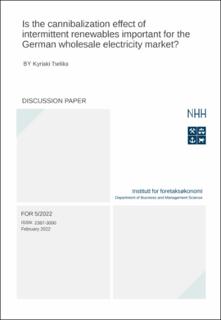Is the cannibalization effect of intermittent renewables important for the German wholesale electricity market?
| dc.contributor.author | Tselika, Kyriaki | |
| dc.date.accessioned | 2022-02-02T11:38:54Z | |
| dc.date.available | 2022-02-02T11:38:54Z | |
| dc.date.issued | 2022-02-02 | |
| dc.identifier.issn | 2387-3000 | |
| dc.identifier.uri | https://hdl.handle.net/11250/2976642 | |
| dc.description.abstract | Employing a quantile regression model, we investigate the impact of renewable sources on their unit revenues (absolute cannibalization) and value factors (relative cannibalization), as well as the cross-effect between technologies. The results indicate that an increase in wind and solar share reduce the technology’s own and each other’s unit revenues. In the case of value factors, an increase in wind share reduces the wind and solar market value. In contrast, there is no evidence of solar decreasing the wind market value. The findings imply that higher share of renewables may raise market risk and may limit future renewable investments, but these results are not uniform across the unit revenues and value factors distribution. | en_US |
| dc.language.iso | eng | en_US |
| dc.publisher | FOR | en_US |
| dc.relation.ispartofseries | Discussion paper;5/22 | |
| dc.subject | Value factor | en_US |
| dc.subject | unit revenues | en_US |
| dc.subject | renewable energy | en_US |
| dc.subject | quantile regression | en_US |
| dc.title | Is the cannibalization effect of intermittent renewables important for the German wholesale electricity market? | en_US |
| dc.type | Working paper | en_US |
| dc.source.pagenumber | 8 | en_US |
Tilhørende fil(er)
Denne innførselen finnes i følgende samling(er)
-
Discussion papers (FOR) [564]
